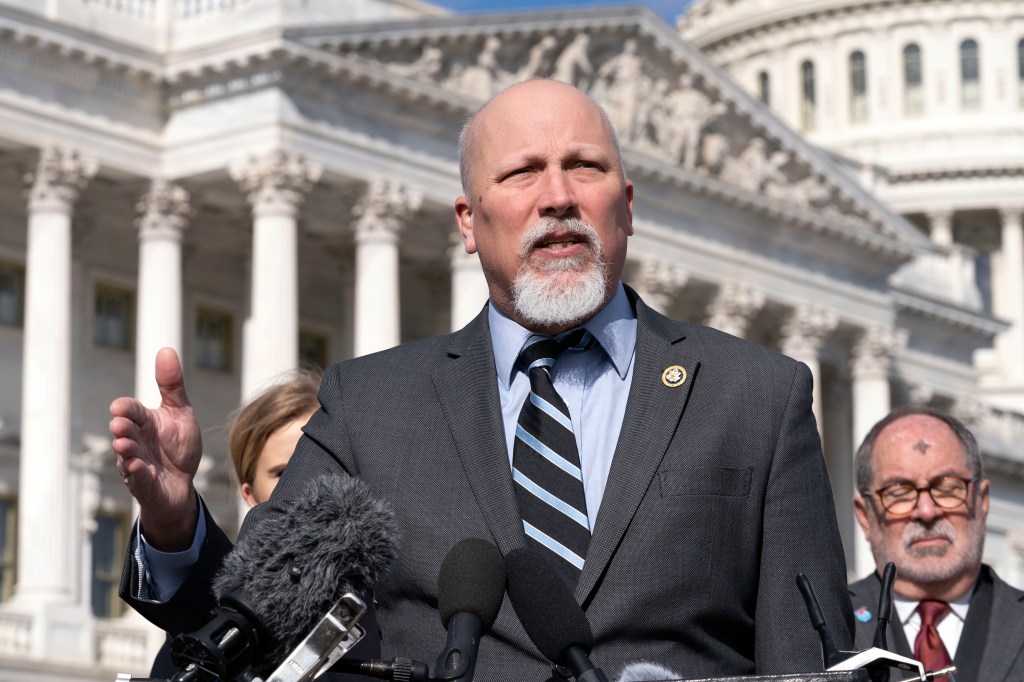Congress finalizes full fiscal year funding bill to avoid government shutdown
Congressional leaders agreed on a final government funding bill late Monday, which would put an end to fiscal fights until the end of September if it passes the House and Senate before 11:59 p.m. Friday.
The six-bill package will fund the Departments of Defense, State, Labor, Health and Human Services, Homeland Security and the legislative branch until Sept. 30 — the last day of fiscal year 2024 — and covers a larger portion of federal spending than the $467.5 billion “minibus” Congress passed March 8.
That measure made it to President Biden’s desk hours before a partial shutdown — despite opposition from fiscal hawks in the House and Senate — and included funding for the Departments of Veterans Affairs, Agriculture, Transportation, Commerce, Justice and Housing and Urban Development, as well as the Food and Drug Administration and military construction.
Both discretionary bills will add up to the topline spending amount of $1.66 trillion for the fiscal year, set in January by Senate Majority Leader Chuck Schumer (D-NY) and House Speaker Mike Johnson (R-La.).
The House approved an $886 billion budget for Pentagon operations in December, whereas non-defense discretionary spending in the Schumer-Johnson deal worked out to $704 billion, of which some has already been passed.
“An agreement has been reached for DHS appropriations, which will allow completion of the FY24 appropriations process,” Johnson, 52, announced in a Tuesday morning statement.
“House and Senate committees have begun drafting bill text to be prepared for release and consideration by the full House and Senate as soon as possible,” he added, referencing the March 22 shutdown date.
Biden, 81, in a separate statement on the funding agreement, pledged to “sign it immediately.”
It’s unclear when the bill text will be released or whether Johnson will allow lawmakers the 72 hours he promised they would have to read the legislation before scheduling a vote.
Congress may have to pass a stopgap measure to buy more time and keep spending at current levels.
Johnson told The Post last week that it was “important” for the appropriations bills to come before emergency supplemental military aid for Ukraine, Israel and Taiwan is considered, as far-right House Republicans have agitated against assistance for Kyiv’s war effort.
“There is a right and wrong there — a good versus evil, in my view, and Ukraine is the victim here … they were invaded,” he affirmed, claiming the “process has been dragged out … because of the White House being unwilling or unable to provide the necessary answers for us to process that sooner.”
Talks have also stalled over immigration issues, with Johnson blaming the White House for including a “dead on arrival” border bill in its earlier supplemental package while calling the “open” US border “the greatest catastrophe on our shores, of our lifetimes.”
“These things are yet unaddressed,” he said, without indicating whether the House would vote on another border bill in addition to funding for foreign allies.
House Minority Leader Hakeem Jeffries (D-NY) in a statement noted the sticking point for the government spending negotiations had been “related to the appropriation of Homeland Security funding,” before a breakthrough Monday night between the White House and Republicans.
Unlike the other five bills, the DHS funding is expected be passed as a continuing resolution with slightly elevated spending from fiscal year 2023 levels, according to reports.
Johnson, Jeffries, Schumer and Senate Minority Leader Mitch McConnell (R-Ky.) all thanked leading congressional appropriators for completing the package.
Start your day with all you need to know
Morning Report delivers the latest news, videos, photos and more.
Thanks for signing up!
“As bill text is finalized, I’m grateful to Senator [Susan] Collins [R-Maine] for pushing tirelessly for Republican priorities, including urgent resources for national defense,” McConnell said on X. “It’s time for Congress to complete our work.”
On Monday, House Freedom Caucus members called on GOP lawmakers to oppose the second tranche of spending “to stop Biden’s open borders policies.”
“The House must put forth an appropriations measure that forces the inclusion of core elements of H.R. 2,” Freedom Caucus chairman Bob Good (R-Va.), Rep. Chip Roy (R-Texas) and 41 other Republicans wrote in a “Dear Colleague” letter.
The lawmakers called on others to reject the appropriations package without the inclusion of provisions that push for more wall construction on the US-Mexico border, blocking illegal entries between ports of entry and reducing eligibility for asylum claims.
The legislation also reinstated the Trump administration’s “Remain in Mexico” policy, which forces migrants to await immigration court hearings south of the US border.
At least 83 House Republicans and 21 Senate Republicans voted against the earlier spending package, compared with just two House Democrats and Sen. Chris Murphy (D-Conn.), who accused Republicans of having “buried” a controversial provision that “rolls back the firearms background check system.”
Johnson has also pledged to take up a bill to reform the Foreign Intelligence Surveillance Act in April, Politico reported, a priority of both his conference and Democrats with data privacy concerns.



















